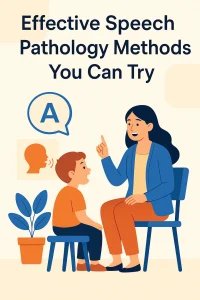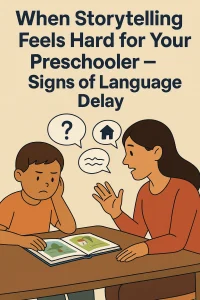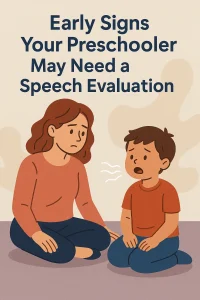10 Myths About Stuttering: Facts & Support
By Rajini D
Last Updated: March 13, 2024
Stuttering is a speech phenomenon that touches the lives of millions globally. Did you know that stuttering affects about 1% of the world’s population? That means nearly 70 million individuals navigate the challenges and misconceptions surrounding this condition daily.
Stuttering is more than just an occasional stumble over words. For those experiencing it, stuttering can significantly impact daily communication, self-esteem, and social interactions. However, the myths surrounding stuttering often overshadow the facts, leading to misunderstandings and, unfortunately, stigma.
About Stuttering
Stuttering is a speech disorder affecting millions worldwide, may seem complex, but it’s rooted in simple facts and realities that impact real lives every day. Imagine speaking and suddenly finding yourself caught on a syllable, unable to move forward smoothly. This is the daily experience for about 70 million people globally. Stuttering can vary in intensity and manifest differently from one individual to another, making it a unique journey for everyone.
The emotional and social impact of stuttering is profound. It’s not just about the words; it’s about the person behind the words struggling to express themselves as they wish. This struggle can lead to feelings of isolation, frustration, and a dent in one’s self-esteem. Understanding these impacts is the first step toward empathy and support.
Read more about The Early Years of Speech and Language.
Myth 1: Stuttering Equals Low Intelligence
One of the most damaging myths is the association of stuttering with low intelligence. This misconception couldn’t be further from the truth. Research and evidence show no link between stuttering and cognitive abilities. In fact, many individuals who stutter are incredibly successful in various fields, from science to the arts. Notable figures like King George VI, Emily Blunt, and Ed Sheeran, who’ve excelled in their careers, stand as testaments to the fact that stuttering does not determine one’s intellect or capabilities.
Know more about: Inspiring Success Stories: Famous Personalities Thriving with Autism Spectrum Disorder.
Myth 2: Stuttering Can’t Be Managed Successfully
The journey through stuttering is not without its triumphs. With the right support and interventions, many individuals who stutter have not only managed their speech patterns but have also achieved remarkable success. The key lies in embracing stuttering as part of one’s unique communication style and leveraging supportive networks, including therapy and stuttering communities. Success stories abound, proving that stuttering is not a barrier to achieving one’s dreams.
Myth 3: Stuttering Is Caused by Nervousness
It’s a common belief that stuttering stems from nervousness or anxiety. However, stuttering is primarily a neurological and genetic condition, not merely a symptom of anxiety. Stress can exacerbate stuttering, but it is not the cause. Understanding the biological underpinnings of stuttering helps in addressing it more effectively and dispels the myth that it’s just about calming one’s nerves.
Myth 4: Stuttering Is Rare and Isolating
Stuttering might feel isolating, but it’s far from rare. With millions of people worldwide experiencing stuttering, there’s a vast community out there. Numerous organizations and support groups provide spaces for individuals to share their experiences, find common ground, and support each other. These communities remind us that no one is alone on this journey.
Myth 5: Stuttering Is Just a Bad Habit
Labeling stuttering as a bad habit oversimplifies a complex speech disorder. Stuttering involves various factors, including genetics, neurology, and environmental influences. Effective management and support go beyond breaking a habit; they require a comprehensive approach that includes therapy, understanding, and acceptance.
Myth 6: Stuttering Can Be Easily Fixed
While stuttering can be managed, it’s not about quick fixes or cure-alls. Speech therapy offers tools and techniques to help manage stuttering, but it’s a personalized process. Each individual’s path to increased fluency or comfort with their speech is unique. Setting realistic expectations is crucial for progress and self-acceptance.
Explore our online speech therapy services to find the right support for you or your loved one.
Myth 7: People Who Stutter Are Not Good Communicators
Communication is more than fluency. Many people who stutter develop exceptional communication skills, learning to convey their thoughts and feelings effectively and empathetically. Their experiences often foster patience, active listening, and a deep understanding of the nuances of communication, enriching their interactions with others.
Myth 8: It’s Helpful to Finish Sentences for Someone Who Stutters
Intuitively, we might think we’re helping by finishing sentences for someone who stutters. However, this can feel demeaning and frustrating. It’s more supportive to offer patience, giving the person the time they need to express themselves, and showing through our actions that what they have to say is valuable.
Myth 9: Only Children Stutter, and They Outgrow It
While many children do stutter, suggesting that it’s a phase exclusively for children is misleading. Stuttering affects both children and adults and not everyone “outgrows” it. Acknowledging this reality is vital for providing appropriate support and resources across all ages.
Myth 10: There’s No Point in Seeking Therapy for Stuttering
On the contrary, speech therapy can be incredibly beneficial, offering strategies and support for managing stuttering. It’s not about seeking a cure but finding effective ways to communicate and express oneself. At WellnessHub, we understand the importance of holistic approaches to speech therapy, supporting individuals in their journey toward self-expression and confidence.
Debunking Stuttering Myths with Facts
| Myth | Fact |
|---|---|
| Stuttering is a sign of low intelligence. | Studies show no correlation between stuttering and intelligence. Individuals who stutter span the full range of IQ scores, similar to the general population. Notable figures who have stuttered, such as scientists, leaders, and artists, exemplify the lack of connection between stuttering and cognitive ability. |
| Stuttering can’t be managed successfully. | While there’s no cure for stuttering, many individuals find significant improvement through speech therapy, techniques to manage disfluencies and support groups. Success stories abound, demonstrating that with the right approaches and support, people who stutter can achieve excellent communication skills and professional success. |
| Stuttering is just a bad habit. | Stuttering is a complex neurological condition influenced by genetic, developmental, and environmental factors. It is not simply a “bad habit” like nail-biting but a genuine speech disorder that requires understanding, therapy, and support for management. |
| Only children stutter, and they outgrow it. | Stuttering affects both children and adults. While many children may outgrow stuttering during early development, for some, it persists into adulthood. The key to managing stuttering effectively is early intervention, which can include speech therapy and supportive practices. |
| There’s no point in seeking therapy for stuttering. | Speech therapy has been shown to be highly effective in helping people who stutter. It offers strategies for managing disfluencies, reducing the frequency and severity of stuttering episodes, and improving overall communication. Additionally, therapy can provide emotional support and boost self-confidence, crucial elements for individuals navigating the challenges of stuttering. |
For those seeking more information or support, WellnessHub offers a range of speech therapy and counseling services to assist on your journey.
Conclusion
In our exploration into the myths and realities of stuttering, it’s vital to reflect on the significance of dispelling misinformation. Through understanding and debunking these ten prevalent myths, we aim to foster a deeper comprehension and empathy toward those who stutter. Stuttering is a multifaceted condition affecting millions globally and is often shrouded in misconceptions that can lead to stigma and isolation. By educating ourselves and spreading awareness, we’re contributing to a more inclusive and supportive environment where every individual feels respected and heard, regardless of their speech fluency.
Encouragement extends beyond just our immediate circles; it’s about creating waves of change in our broader communities. Share the insights you’ve gained from this discussion with others, and let’s build a foundation of acceptance and support together. For anyone seeking further information, guidance, or support regarding stuttering, WellnessHub stands as a beacon. Our platform is designed to connect you with resources, professional advice, and a community that understands and supports your journey. Together, embracing patience, understanding, and encouragement, we can change perceptions and celebrate the diverse voices that enrich our world.
Frequently Asked Questions:
1. What exactly is stuttering, and how does it affect individuals?
Stuttering is a speech disorder characterized by repetitions, prolongations, or blocks in the flow of speech. It affects about 1% of the global population, impacting their daily communication, self-esteem, and social interactions. Stuttering varies in intensity and can manifest differently from one person to another.
2. What causes stuttering? Is it related to nervousness or anxiety?
Stuttering is primarily a neurological and genetic condition, with stress and anxiety potentially exacerbating it. However, it is not caused by nervousness. Understanding its biological underpinnings helps address stuttering more effectively.
3. Can stuttering be successfully managed, and how?
Yes, many individuals who stutter have successfully managed their speech patterns through therapy, embracing stuttering as part of their unique communication style and leveraging supportive networks. Success stories abound, proving that stuttering is not a barrier to personal achievement.
4. Does stuttering indicate low intelligence?
No, there is no link between stuttering and cognitive abilities. Many individuals who stutter are highly successful across various fields, demonstrating that stuttering does not determine one’s intellect or capabilities.
5. Is speech therapy beneficial for individuals who stutter?
Absolutely. Speech therapy offers strategies and support for managing stuttering, focusing on effective communication and self-expression. It is a personalized process, with each individual’s path to increased fluency or comfort being unique.
6. Is stuttering only a childhood condition, or does it affect adults as well?
Stuttering affects both children and adults. While many children may experience stuttering, not everyone outgrows it, making it essential to provide appropriate support and resources across all ages.
7. What are some common myths about stuttering?
Common myths include the belief that stuttering is caused by nervousness, is a sign of low intelligence, is just a bad habit, or cannot be successfully managed. These misconceptions contribute to stigma and misunderstandings about stuttering.
8. Do people who stutter have poor communication skills?
Contrary to common misconceptions, many people who stutter develop exceptional communication skills. Their unique experiences often foster patience, active listening, and a deep understanding of the nuances of communication, enriching their interactions with others.
9. How important is community support for individuals who stutter?
Community support is crucial for individuals who stutter. It provides a space for sharing experiences, finding common ground, and supporting each other, thereby reducing feelings of isolation. Organizations and support groups play a significant role in building these supportive communities.
10. Can stuttering be completely cured?
Stuttering management focuses on improving speech fluency and comfort rather than seeking a cure. The approach is personalized, with speech therapy offering tools and techniques to help individuals manage their stuttering. Success in managing stuttering varies from person to person, and it’s about setting realistic expectations and working towards self-acceptance and effective communication.
About the Author:
Rajini Darugupally
M.Sc., Speech-Language Pathologist (9+ years of experience)
Rajini is a passionate and dedicated Speech-Language Pathologist with over 9+ years of experience, specializing in both developmental speech and language disorders in children and rehabilitation in adults. Driven by a desire to empower each individual to find their voice, Rajini brings a wealth of experience and a warm, genuine approach to therapy.
Currently, at Wellness Hub, she thrives in a team environment that values innovation, compassion, and achieving results for their clients.
Connect with Rajini to learn more about how she can help you or your loved one find their voice.
Book your Free Consultation Today
Parent/Caregiver Info:
Client’s Details:
* Error Message









